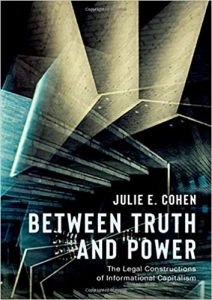I’d been looking forward to reading Between Truth and Power: The Legal Constructions of Informational Capitalism by Julie Cohen. I start out sympathetic to the key argument that the legal system is the product its society – the material economic and technological and also the political conditions. Therefore current legal contests reflect underlying changes in these same forces, and the final legal system for the digital era is still in the process of being shaped. Law and the implementation of technologies in society influence each other – the ‘rules of the game’ are not exogenous.
There are indeed some interesting insights in the book. I most enjoyed some of the earlier parts, which are more descriptive of the extension of the idea of intangibles, ideas, as “intellectual property”. This is not new – James Boyle for one has written superbly about it. But the detail here is interesting, plenty of nuggets about the US legal system and how truly, gobsmackingly awful it can be.
I also appreciated the chapter on regulation, and its basic point that many regulators are now having to “move into the software auditing business”, and indeed may have to evaluate software controls designed to evade regulation. Implications here for analysing regulation in the digital economy in terms of hyper-asymmetric information and algorithmic complexity.
On the whole though, I was disappointed. The book is almost entirely US focused – and is upfront about it – but the US system is distinctive even compared to other common law jurisdictions. Nowhere else, for instance, has its 1st Amendment fetishism. It would have been terrific to have some reflections on the extra-territoriality of US lawmaking and court judgements in the digital domain.
The book has some tantalising reflections about the limitations of law, based on concepts of individual rights, in the face of collective effects: as I’ve been arguing for a while eg here, digital power spells the end of individualism, including what we all now call the neoliberalism that gave birth to it. More on this would have been great.
There’s also just too much sub-Zuboffian rhetoric (rather than argument) about the ‘surveillance-industrial complex’. I’m all too willing to believe this exists, so all the more disappointed when the analysis is so vague. There’s also a lot of allusion to Foucault – “biopolitics”, “governmentality” – in the book without it ever – as far as I spotted – actually citing and deploying The Birth of Biopolitics.
All in all, there’s a lot of detail in this book that didn’t, at least for me, cohere. Too many trees, not enough overview of the wood. Perhaps it’s time for me to try the highly-praised The Code of Capital by Katarina Pistor.


I got attracted by the name of the blog as I am interested in social awakening through enlightened economics. One of the core institutions of modern economics is fractional-reserve based (more like no-reserve now) is centralized privatized commercial banking and its intangible product of digital currency. May be here the core of the delusion exist.